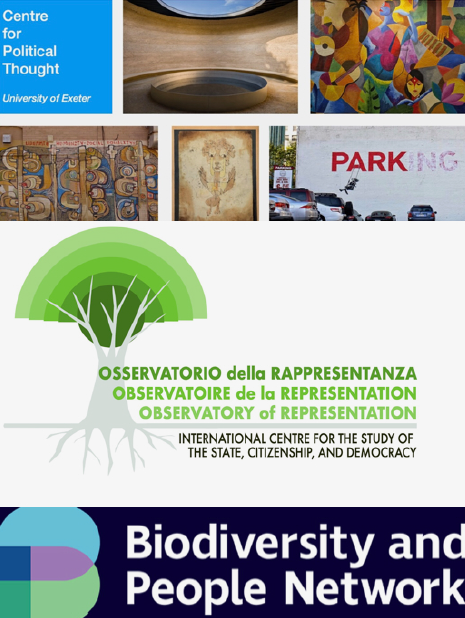Environmental Ethics and Intergenerational Justice
We face multiple environmental crises. Climate change is accelerating, biodiversity is in freefall, plastics are everywhere, and soils are depleted. In our research, we treat these crises as fundamentally social, political, and ethical, and of particular concern from an intergenerational perspective: future people are entirely vulnerable to our present choices, and our present failures to prevent multiple ecological disasters raise multiple questions of justice that we address in our research. We are committed to working across multiple disciplines, and with external partners, to focus our research on ethically sound solutions to improve the world for our descendants.
 |
Dr Ross CarrollRoss Carroll's research interests are in the history of early modern political thought, with a focus on eighteenth and nineteenth century Britain and France. His first book, Uncivil Mirth: Ridicule in Enlightenment Britain (Princeton 2021), recovers the Enlightenment debate on the appropriate use of ridicule as an instrument of moral and political reform. He has also published recently on Mary Wollstonecraft's views on political economy, the history of contempt as a political and moral concept, and the hidden intellectual labour performed by the wives of great political thinkers such as Alexis de Tocqueville. At present Carroll is writing a short book on Edmund Burke and plans a future research project on the political thought of the French political theorist and abolitionist, Gustave de Beaumont. |
 |
Dr Lise HermanLise Herman’s research bridges the fields of comparative politics, party studies and normative democratic theory, with a primary focus on the theory and practice of democratic partisanship. She has written extensively on the role of partisan agency in the contemporary crisis facing representative democracy. This includes the rise of the populist radical right in established democracies and processes of democratic backsliding in newly established democracies - with a particular focus on Hungarian politics. |
 |
Professor Robert LambRobert Lamb is interested in the history of political ideas, contemporary political theory, and philosophical issues related to the interpretation and understanding of texts. The main focus of his research is the intellectual tradition of modern liberalism – understood very broadly, and from the eighteenth century to the present – and its central political commitments. His published work has concerned historical and philosophical understandings of moral and political concepts such as human rights, property, equality, and freedom, and writers such as Locke, Paine, Rawls, and Rorty. His current research looks at the idea of political hope. |
 |
Professor Catriona McKinnonCatriona MacKinnon’s main research interest is currently in the area of climate justice and climate ethics. Her research adopts a broadly liberal approach which reflects her other research interests in contemporary liberal political philosophy (especially Rawls), and the theory and practice of toleration. In her work, she takes seriously what we owe to future people in the face of the climate crisis. Although most of her work has been in 'pure' political philosophy, she is increasingly engaged in transdisciplinary work on climate justice in order to better inform climate policy. Before coming to Exeter she was the Director of the Leverhulme Doctoral Programme in Climate Justice, and Director of the Centre for Climate and Justice, both at the University of Reading. |
 |
Dr Jack TagneyJack's research lies in the space between ethics, political thought, and philosophy of nature/biology. He is primarily interested in the inter-relations between human understanding of nature, especially the organic world, and thought/action in the socio-political and environmental spheres. He has published on the political significance of contemporary understanding of evolutionary and developmental biology; the tendency to appeal to 'nature' as a source of moral and political authority; and the role of the interpretation of organic phenomena in bioethical reasoning. He is currently doing research on the attitude of wonder in environmental and social relations, on the relationship between dehumanization and species essentialism, and on the Aristotelian concepts of life and flourishing. |
Catriona McKinnon
‘The Panglossian Politics of the Geoclique,’ Critical Review of International Social and Political Philosophy(forthcoming).
‘The Justice and Legitimacy of Geoengineering’ (with S. Gardiner), Critical Review of International Social and Political Philosophy, 23(5), 2020, 557-563.
‘Climate justice in the endgame for 2 degrees, ‘British Journal of Politics and International Relations, 21(2), 2019, 279-286.
‘Climate justice: integrating economics and philosophy,’ ENVIRONMENTAL POLITICS, 28(5), 2019, 977-978.
‘Governing Climate Engineering: a Proposal for Immediate Governance of Solar Radiation Management’ (with al.), SUSTAINABILITY, 11(14), 2019.
‘Sleepwalking into lock-in? Avoiding wrongs to future people in the governance of solar radiation management research. Environmental Politics, 28(3), 2019, 441-459.
‘Endangering humanity: an international crime?,’ Canadian Journal of Philosophy, 47(2-3), 2017, 395-415.
‘Should We Tolerate Climate Change Denial?,’ Midwest Studies in Philosophy, 40(1), 2016, 205-216.
Climate Change and Future Justice, Routledge, 2011.
Jack Tagney
‘Bioethics, the Ontology of Life, and the Hermeneutics of Biology,’ in Phenomenology of Bioethics: Technoethics and Lived Experience ed. Susi Ferrarello. London: Springer Nature, 2021. Pages 1-21. (Published as Griffiths, J. O.)
‘Out of Order: Lorraine Daston on Being ‘Against Nature.’ Global Discourse 11 (2020) Pages 289–294. (Published as Griffiths, J. O.)
‘The Changing Space Between Politics and Biology.’ Contemporary Political Theory 16 (2017) Pages 541–548. (Published as Griffiths, J. O.)
Catriona MacKinnon
- 2023-2028, Co-director of RENEW: Partnership programme for the renewal of biodiversity between University of Exeter and the National Trust, funded by NERC
- 2015-20: Programme Director, Leverhulme Doctoral Programme on Climate Justice.
- 2014-16: Research Fellowship, The Leverhulme Trust, ‘Postericide: Crimes Against Future People’.
- 2007: Senior Research Fellowship, British Academy/Leverhulme Trust.: ‘Corrective Justice and the Precautionary Principle: Liberal Approaches to Climate Change?’.
- 2006: Research Fellowship, Leverhulme Trust. ‘Tackling Climate Change in a Liberal Framework’.
RENEW: a five-year partnership programme to develop solutions to one of the major environmental challenges for humankind: the renewal of biodiversity.
A Review of the RENEW Parliament 2023 with Rebecca Edgerley
The annual RENEW Parliament convened on 8th – 9th November 2023, this year at the National Trust head office in Heelis, Swindon. It might seem odd to begin at the end, but the energy and activity at the close of the Parliament seemed just as high, if not higher than at the outset.
Find more about:
Biodiversity and People Network:
academics, businesses, civil society, and government bodies who share a common concern over the loss of biodiversity and the urgent need for its renewal.

The workshop consists of three sessions on ethical, legal, and constitutional perspectives, introduced respectively by:
Chris Gill (Classics Exeter)
Pierre Brunet (Paris 1 Sorbonne)
Stephen Gardiner (University of Washington, Seattle)
This event is jointly organized with the Biodiversity & People Network and the Observatory of Representation: International Centre for the Study of the State, Democracy and Citizenship.

